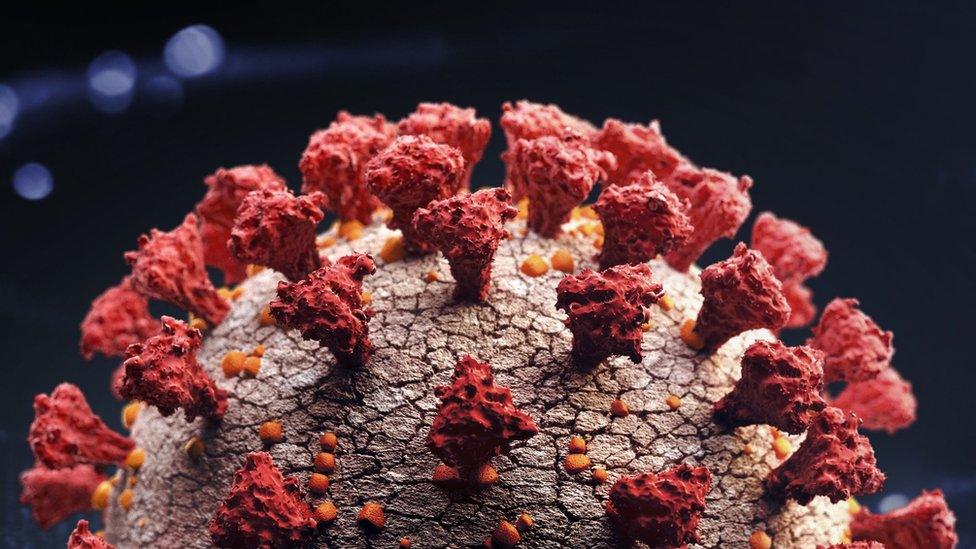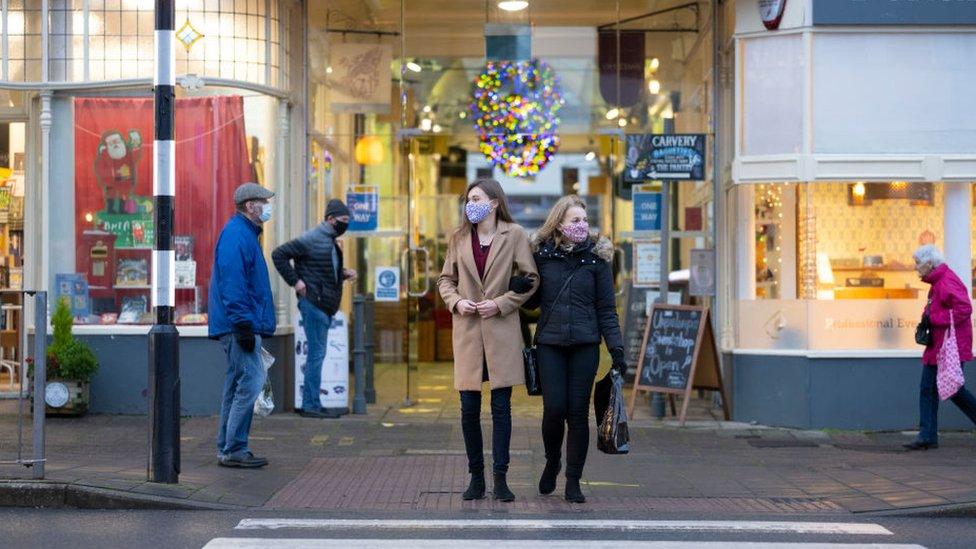Covid: New coronavirus strain present in Wales
- Published
- comments

At least 10 cases of the new variant have been identified in Wales
A new strain of coronavirus which was found to be circulating in England is already present in Wales, the Welsh Government has confirmed.
On Monday, the UK government said the variant "may be associated" with a faster spread in south east England.
The Welsh Government said there were at least 10 confirmed cases in Wales and more were expected to be identified.
An expert who helps track mutations of the virus said he was "not especially concerned" and urged calm.
More than 1,000 cases have been recorded across 60 English council areas.
Matt Hancock, the UK government minister in charge of the NHS in England, said there was "nothing to suggest" it caused worse disease or that vaccines would no longer work.
Announcing tougher restrictions in London and parts of Essex and Hertfordshire, he said: "We've currently identified over 1,000 cases with this variant predominantly in the south of England, although cases have been identified in nearly 60 different local authority areas.
"We do not know the extent to which this is because of the new variant, but no matter its cause we have to take swift and decisive action which unfortunately is absolutely essential to control this deadly disease while the vaccine is rolled out."
He said the World Health Organization had been notified of the new variant and UK scientists were doing detailed studies.

Prof Thomas Connor helps track mutations of the virus
Cardiff University Professor Tom Connor, bioinformatics lead at Public Health Wales, said: "We see numerous numbers of variants accumulating in the population.
"The virus is continually introducing these changes as it progresses."
Most mutations to the genetic code of the virus will have no impact on its risk to the public, he explained, but said it was important to monitor because an increase in the prevalence of a variant could be for a "biological reason" such as increased transmissibility.
Prof Connor said the new variant - called N501Y - could plausibly reduce the effectiveness of the vaccine because the mutations "fall within the spike proteins".
"That's the protein on the outside of the virus that helps it get into cells and actually cause the infection," he explained.

Wales has seen a rise in cases ahead of Christmas
Both the Moderna and Pfizer/Biontech vaccines rely on spike proteins, Prof Connor said.
He urged people not to be alarmed and to carry on following advice to observe social distancing, wash your hands and wear a face covering.
He added: "We are potentially moving towards the point where we go from this being a pandemic to an endemic - so a disease which is circulating in the human population and we vaccinate against it every year, for example like we do with influenza."
The Welsh Government reiterated it was "natural for the virus to mutate", adding that further sequencing and tracking was taking place.
Dr Gill Richardson, who is senior responsible officer for the Covid-19 vaccine in Wales, said: "Viruses are living beings that change and adapt, and we know that since the original Wuhan virus there [have] actually been 25 mutations.
"It's important to say that at the moment it is not thought to affect the behaviour of the virus at all, and it's not thought to affect the effectiveness of the vaccine."


There is a simple rule for understanding all "new strain" or "new variants": Ask whether the behaviour of the virus has changed.
This is crucial as viruses mutate all the time, it's just what they do. And so far we've been given the "scare" but not the "answer".
Matt Hancock said the new variant of coronavirus "may be associated" with the faster spread in the south-east of England.
This is not the same as saying it "is causing" the rise and Mr Hancock did not say this virus has evolved to spread from person-to-person more readily.
New strains can become more common for reasons that have nothing to do with the virus.
One explanation for the emergence of the "Spanish strain" over the summer was tourism.
So at the moment there are scary headlines everywhere, but still no scientific detail to know how significant this is.

The news of the new variant comes as cases continue to rise in Wales.
On Monday it was revealed Wales was already breaching some of the key indicators used to determine if the country goes into lockdown.
First Minister Mark Drakeford said a lockdown could be introduced after Christmas if rates do not begin to fall.
Public Health Wales figures on Monday showed Merthyr Tydfil had the highest case rate in the UK, with 870.3 cases per 100,000 people over the most recent seven days.
Eight Welsh counties were among the 10 areas with the highest case rates in the UK.
Related topics
- Published14 December 2020
